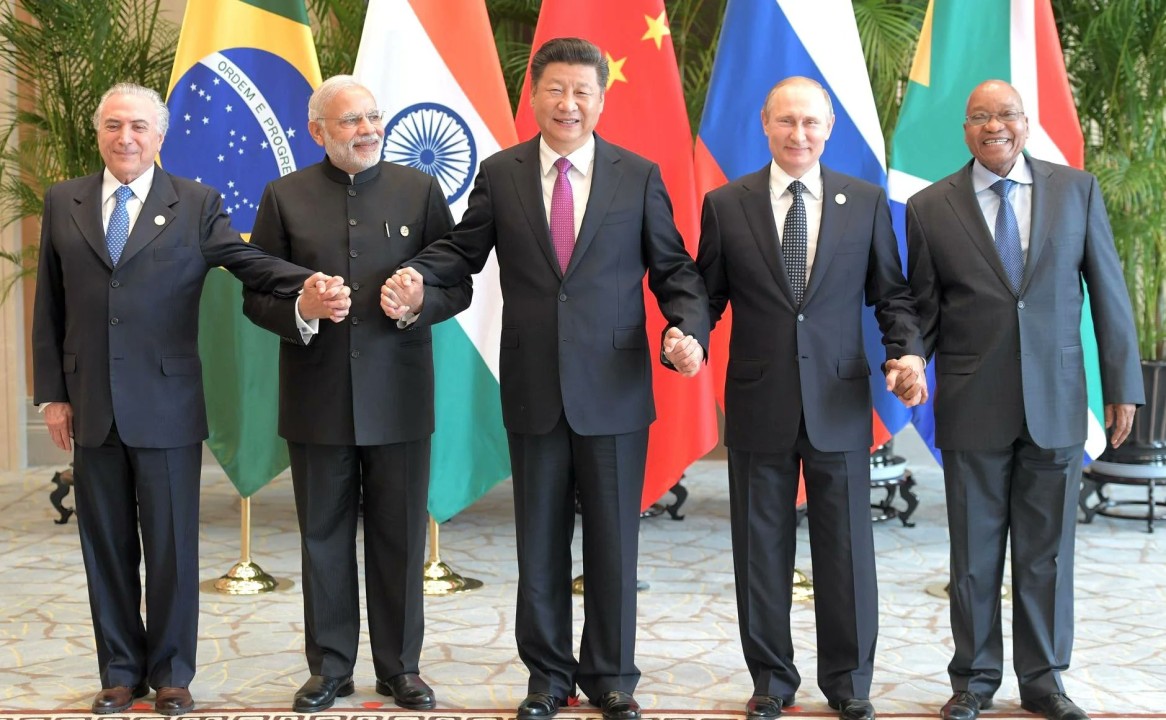The expansion of the BRICS group of emerging economies has coincided with the US dollar’s loss of dominance as the world’s reserve and trade currency.
Professor and economist Richard Wolff said that the two trends were linked.
The rise of the BRICS group is directly linked to the decline of the US dollar says a top economist.
Economist Richard Wolff told newsmen that the US displaced its mother country Britain as the world’s dominant imperial power around 1920 — and that history was now repeating itself.
“The American empire didn’t work the same way. It didn’t set up colonies the way the British had in India or South Africa or any of the other places,” Wolff said. “It had a more informal empire. [From] The way it had managed to control Latin America throughout the early years of this country to how they expanded and controlled the world by economic arrangements, by political deals, by alliances.”
But the US empire peaked around the year 2000, the academic said, and is now in decline: “We lost the wars in Vietnam. We lost the war in Afghanistan. We lost the war in Iraq,” Wolff said. “It’s not clear what’s going to happen in Ukraine. But I wouldn’t bet money on a different outcome there either. And that war is a war between the United States and Russia more than anything else, with the disaster being concentrated on Ukraine.”
While the US leads the G7 group of the biggest Western economies, “there’s a different other bloc, and that’s what’s new, it’s the bloc called the BRICS – Brazil, Russia, India, China, South Africa, and their allies and supporters”
“The BRICS now account for 33 per cent, one third of the total output of goods and services on this planet, whereas the United States and its allies have slipped to under 30 per cent, about 29 per cent of total output.”
“I could give you ten other statistics and they all point in the same direction. This is an empire that is declining,” he added.
The conflict in Ukraine and Western sanctions on Russia — the world’s biggest energy and food grain exporter — has accelerated that downfall.
“The economic war between Russia and Europe is being lost by Europe, not by Russia, which was not the intent, but is the outcome,” Wolff said. “The Europeans are going to have to ask themselves, which side are you on? Are you going to stay with the US and the G7 and heading down the slide of your bloc as the BRICS blocs rises, or are you going to choose the other way?”
The academic pointed out that when the UK had the world’s greatest empire from the 17th to the 19th centuries, the pound sterling was the “global currency.” With the rise of the US in the 20th century the dollar usurped the pound.
“What that means is that everywhere in the world, people need dollars to do their business. Central banks hold dollars as that alongside of gold, as the guarantor of the value of their currency,” Wolff explained.
Now BRICS has overtaken the G7 as “the dominant economic bloc in the world,” a new contest has begun which will end in “the decline of the dollar and the rise of whatever alternative the BRICS settle on, either the Chinese currency or a composite that they’re producing.”
“De-dollarization refers to what is already underway — the declining use of the dollar in international trade. The best example is Saudi Arabia which a few weeks ago stopped demanding that the world pay for oil in dollars and said they will now accept payments for oil in the Chinese yuan and in other currencies. This is a part and parcel of the decline.”


